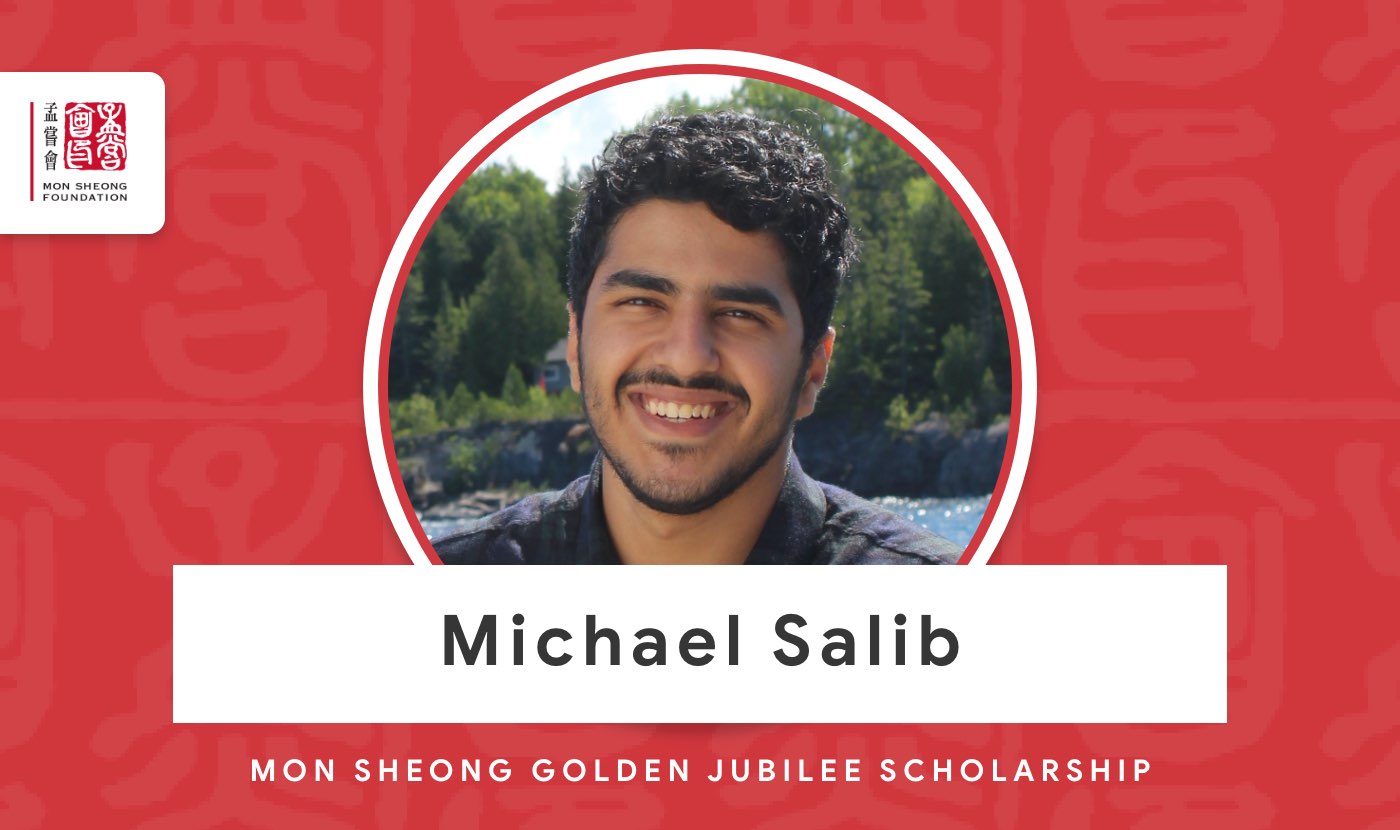What does it take to receive the Golden Jubilee Scholarship? We asked Michael Salib for the deets.
Show as much of yourself as you can and be relatable! Your scholarship application should be unique and authentic. Don’t just write what you think the panel of judges wants to hear. They can see right through you. – Michael Salib
If you’re wondering what the Mon Sheong Foundation’s Golden Jubilee Scholarship is all about – you’ve come to the right place!
Basically, Dr. Sim Fai Liu and Reverend Ron Con founded the Mon Sheong Foundation back in 1964 as a charitable organization to promote Chinese culture and heritage. The organization provides programs and services to the elderly and to the young in response to the needs of Canada’s culturally diverse communities.
So, the foundation launched the Golden Jubilee Scholarship for the go-getter students, motivated to spark change within their communities and to carry out the values of the Mon Sheong Foundation.
Here’s a high-level overview:
Scholarship Value: $1,000/year for a maximum of four years.
Application Deadline: July 5th 2020
You Can Apply If:
- You’re graduating from a Canadian high school or CEGEP with a minimum average of 80% among your top 6 grade 12 or CEGEP marks
- You’re enrolled full-time in a degree or diploma program at a publicly funded Canadian university or college beginning Fall 2020
- You’re aspiring to have an even greater impact through your education and experience
Where To Apply: The Mon Sheong Foundation Website
This is what Michael Salib had to say about receiving the Golden Jubilee Scholarship valued at $4,000!
Be You. The World Will Adjust.
Who is Michael Salib? We’re so glad you asked!
Michael recently graduated from St. Aloysius Gonzaga Catholic Secondary School in Mississauga, Ontario. He is currently studying Architecture at the University of Waterloo. Given the complications surrounding COVID-19, Michael will be studying remotely for his first semester but hopes to move to Cambridge in the winter to study on campus at Waterloo’s School of Architecture (fingers crossed for you, Michael!).
When it came to writing his application essay, he emphasized his individuality to set himself apart from competing candidates.
Michael showcased as “much of [his] identity as possible. [He] wanted the panel of judges to see [his] individuality and what [he] had to offer. [He kick-started his] essay with a very short story from [his] life, a troubling time that would become one of the most defining moments of [his] life. [He] then gave specific examples to answer the questions and kept it concise. [He] also discussed topics that are relevant to today’s society and [his] plans for making a difference.”
Basically, the key to writing a killer scholarship essay is to make yourself memorable. Our advice? Go into every scholarship essay asking yourself three questions:
- Who are you?
- What do you offer?
- Why does it matter?
If you’ve answered those questions, chances are you’ve written a compelling essay.
Michael also shared with us that “there were two components to the application, an online form, and a PDF attachment. The online form consisted of basic personal and academic information, a report on volunteer experiences, extracurricular activities, and leadership roles, and a 500-word essay response to the question, “How would you like to make a difference? What motivates you to create this change? And how do you plan on making this happen?”
Plus, you’ll need to include all relevant report cards, including your top 6 Grade 12 or CEGEP courses, a reference letter from someone that can speak to your leadership, academics and contribution. Oh, and they’ll need your declaration and signature as well.
You Can’t Teach Work Ethic.
We asked Michael how he anticipates being a Golden Jubilee Scholarship recipient will influence his future career search:
“Being a Golden Jubilee Scholarship recipient will set me apart from competing candidates in my job search post-graduation by demonstrating my initiative. Scholarships aren’t handed to you, you have to look for them and do the work! Also, to continue receiving the scholarship, I must maintain an 80% average throughout my four years at university. If I can maintain that score, hiring managers in my post-graduation job search will hopefully see my dedication and strong work ethic.”
Michael’s right. Earning a scholarship will show future employers that you were thinking ahead. But not only that, it demonstrates commitment, hard work, and dedication – all of which are qualities that are not easy to teach in the workplace.
Someone’s Gotta Win.
Listen up, folks! There’s only one way to know for certain that you won’t win a scholarship – and that’s if you don’t apply.
Michael shared with us that his “biggest take away from [his] scholarship application process is that it [could really be him]! [Students] often look at scholarship winners and think that receiving a scholarship is so unattainable. So, they just give up.”
This one should be a no-brainer. Always apply! Worst case scenario? You don’t win, and you’ve lost nothing!
Congrats on winning, Michael. We wish you all the best at the University of Waterloo.
Looking for more ways to make student stuff easier? yconic is all about preparing Canadian students, like yourself, and your parents for college and university. That means matching you with the right school, helping you with tuition costs, and providing advice on how to live your best post-secondary life.

